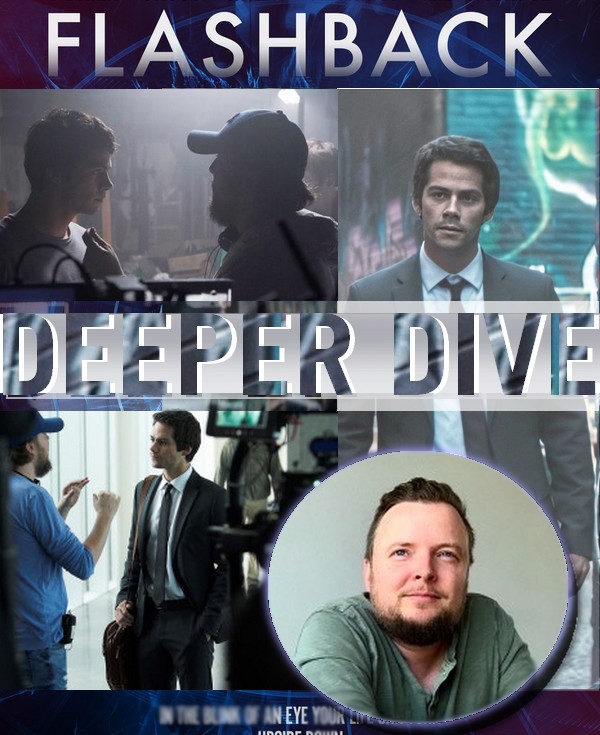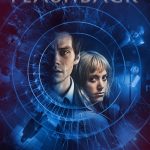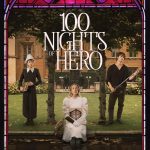“Flashback” Director Chris MacBride Takes Us on a Deeper Dive
If you’re like me, when you watch a movie, directly after the end credits you’re heading back to the menu to check out the special features! Whether it’s deleted scenes, the director’s commentary, or going online to read fan theories and interviews. When I had the opportunity to speak with Chris MacBride about his film Flashback, I couldn’t miss the chance to go deeper into the mind of this creative and innovative director.
WARNING: This article contains heavy spoilers and lots of navel-gazing as we deconstruct the themes and characters of the film. Yes, at one point we discuss lucid dreaming. Get your SCUBA gear ready, kids. We’re going for a DEEP DIVE!
For a quick recap, Flashback stars Dylan O’Brien (Love & Monsters) as Fred Fitzell, our sometimes present protagonist, and Maika Monroe (It Follows) as the subject of Fred’s obsession. After thumbing through an old yearbook Fred goes on a journey to find out whatever happened to Cindy. The journey inevitably leads Fred to discover what happened to himself.
MacBride and I spoke for over an hour, so the interview has been released between this deep dive and the initial spoiler-free interview. Please remember that spoilers lie ahead and deep analysis into plot, influences and characters.
The Geekiary: Tell us what you think the film is about.
Chris MacBride: The conceit of the film is that in the beginning, when you’re an infant, everything is now, now, now. It’s all the present and you need to be taught and educated on how to perceive time in a linear way. When a baby’s about to touch a hot stove and it burns them, that experience becomes a lesson. If the baby, the next time, can think of past and future, their mind can go, ‘I remember this place [where] I was, that isn’t now called the past and something happened. From that I can extrapolate this other place [where] I’m not yet called the future where this will happen again.’ And so it’s through our parents educating and disciplining us on what to do and what not to do to stay safe that we start to perceive future and past.
***
MacBride, the father of three children, understands the demands and limitations of this discipline.
CM: We do it to keep our kids alive! But there’s something ingrained in that education that also sort of limits us to perceiving a linear sense of time.
***
MacBride then began to talk about the emotions and senses he attributes to breaking free of this way of linear thinking. In Flashback, Fred opens the gates by trying mercury or ‘merc’. It allows him to access the parallel timelines running simultaneously to his own. To understand how to best portray this, MacBride relied on visualizations of indescribable feelings.
CM: There have been moments in my life where I’ve been in a very ‘normal situation’, I’m in some film meeting or boardroom – it could be anything, even just sitting around with my grandmother – and out of the blue my mind will start to daydream back to when I was a teenager in some bizarre situation. The weirdest thing will trigger my memory, I’ll touch a table that has a certain texture that will remind me of being on LSD. And I would become obsessed with that table and I hadn’t thought about it in 15 years!
It’s an interesting phenomenon that you have these really intense, life-changing experiences and then you forget. You wake up the next day and you’re like, ‘Oh, I gotta go back to school, I gotta do my homework, I gotta do this.’ and you just so quickly moved past these sublime experiences you have and then 15 years later they just come back and hit you.
***
This is Fred’s intro into his search for Cindy. A random night flipping through unpacked yearbooks reveals that Cindy’s face has been scratched from the row of seniors. It’s then that Fred realizes he doesn’t remember what happened to her, and resolves himself to find out.
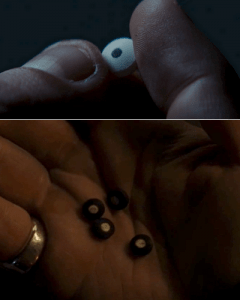 TG: Is this a drug movie?
TG: Is this a drug movie?
CM: It’s funny because people perceive the film in different ways. Some people have said, ‘Wow, this is such an anti-drug movie!’ And I never thought of it that way, I actually think of it as the opposite. It’s neither pro nor con, it’s not even about drugs, it’s about what the drug in the film represents and that’s free will. It’s just a way to be free of this mess of things inside you that are influencing your decision-making process – the drug has a way of stripping those things away.
TG: In terms of parenting and creating a past and future for a child so they can understand their world, you’re creating a box and saying, ‘I need you to operate within these boundaries because right now you are so vulnerable that you have to have this kind of structure to live in’. I feel as children we kind of accept that. There are definitely moments in my life where I don’t remember them at all. I do wonder if that’s a part of it, where the memory was tucked away because I needed to be in that box. Before I developed self-preservation.
CM: Yeah, and the thing is, you can’t live like that. You have these moments in life like, ‘You know what? I’m not gonna be constrained anymore. I’m not gonna wear clothes anymore!’ But there are these boundaries; you need to make money and you need to have a job and have human relationships. So it’s like holding your breath underwater and seeing the world from that view, but you just can’t stay there.
***
In the film Fred tries his hand at this life with Cindy who we see has been practicing these trips for several lives. Before this can happen though, we see Fred come to grips with the idea that the current present he’s in, isn’t his only one.
CM: There’s a scene in the film with Fred and Andre when they’re 30 and they’re on the couch talking to each other. All of a sudden the conversation is totally normal and mundane and boring, and then they go sideways where one of them starts talking as if he’s 17. But he’s 30. That confuses Fred, and I wanted it to give just this creeping feeling of dread that sometimes happens in dreams when things are a little off but you still think it’s normal. It slowly leads to a bigger thing that’s off and gives it a sort of lucid dreaming flow.
TG: Yes, and to great effect. That was one of my favorite scenes.
As MacBride explains, the scene involved Fred and Andre playing catch up in each other’s lives when Andre asks about the big test on the next day. A test they already took some 12 years ago. The feeling of disorientation is vivid in the scene.
TG: I saw that there was a lucid dreaming type of element in terms of – we see him on this trip. Did you take anything away from lucid dreaming or was it a part of your thought process? The idea of changing your dreams and changing the outcomes based on minute changes within the environment?
CM: Yeah! I used to practice lucid dreaming a lot when I was younger. I read all the Carlos Castaneda books, and all that stuff. In order to really do lucid dreaming, it’s something you have to practice and work at. In your daily waking life, you have to always ask yourself if you’re dreaming and have little things you do so that it becomes a habit. So when you’re dreaming you hope that habit kicks in. It became terrifying after a while once I really got good at it. It was thrilling, but also, it got to the point where I got scared of going to sleep because I would be totally conscious in my dream, but unable to wake up. I stopped doing it.
***
It’s an interesting parallel to draw between Fred and Cindy in the film. Both have access to a mind-bending substance that allows them to experience life without the barriers of reality. However, where Cindy is untethered to this world, Fred finds his connections are much harder to fully leave behind.
“There’s so much to explore when you don’t succumb to pleasure or fear,” she says as Fred begins his first trip. He seems to hear her, but we realize he doesn’t fully understand until later.
To understand Fred’s connections back to the ‘norm-core’ world, I asked MacBride about the role of the women in the Flashback. There are 4 primary female roles and while they seem to be just supporting players, they really are the heart and framework of the film.
First is Cindy, portrayed in all of her temporal glory by Maika Monroe. There’s a scene where Fred tells her, “I don’t think we’ve had a conversation when I wasn’t on this drug”, and it’s telling of their relationship and her ‘manic pixie dream girl’ status in his mind. For a while, I thought she might just be a figment of his imagination. She’s an ideal and during the movie we see Fred trying to track her down to “save” her, when she’s the last person who wants or needs it.
TG: She’s another kind of high school person that you just knew. Like, this pretty girl could be a cheerleader, but instead, she’s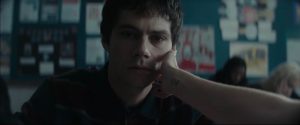 just so obsessed with trying to escape from herself. She kind of falls into this drug and I love the scene in the classroom where the teacher asks if she was listening and she replies correctly, but clearly inebriated. During the test she holds her hand out to Fred’s face and the look on her face, she was just soooo goood. I knew exactly that girl and I wanted to save her too, I wanted to get her out of there.
just so obsessed with trying to escape from herself. She kind of falls into this drug and I love the scene in the classroom where the teacher asks if she was listening and she replies correctly, but clearly inebriated. During the test she holds her hand out to Fred’s face and the look on her face, she was just soooo goood. I knew exactly that girl and I wanted to save her too, I wanted to get her out of there.
Especially because as we see later, she’s content, but she’s still in trouble. You want to save her, but she has no idea. She’s numbed herself to the fact that she even needs saving. I think there’s a part where Fred finally recognizes that. What are your thoughts about their relationship and connection in the film?
CM: I always thought of it as, there’s this group of them – Sebastian, Andre, Cindy and Fred. And Cindy is the bravest of them. She’s the real explorer where the other three are tourists. I talked to Maika about this and we had an elaborate backstory for Cindy, that she didn’t have parents, and she didn’t have this tie to the ‘real world’ the way the boys did. The boys all have this grounding connection to their parents in different ways, even Sebastian still lives with his mother and Cindy doesn’t have that.
So as they take this drug and start to explore time simultaneously, the boys all chicken out eventually. Fred lasts a little longer than the other two.
***
I mentioned Cindy’s ‘pleasure/fear’ quote above and MacBride took time to discuss the meaning behind it.
CM: Cindy says, ‘There’s so much to explore if you don’t succumb to pleasure or fear”. In a lot of ways, she’s referring to the initial reaction to the education from your parents. The positive or negative reinforcement from our mother on what behavior is acceptable in the world and what’s going to keep you safe. And so Cindy, without having that grounding, she’s like an astronaut. The boys all get lonely and they miss Earth too much. They all go back even though Fred leaves earth for a while, we see him leave his girlfriend, his wife, his job and his mother to go with Cindy.
But eventually, his lack of true free will takes him back, whereas Cindy is the only one who is truly free. She’s the one who embraces free will and has nothing to hinder that. So she not only leaves Earth, she goes to Mars. Whether she ends up as a vagrant or living in Paris, whether she’s good, bad or ugly, she’s free and truly embracing her free will. Fred can latch on to that for a while, but ultimately he can’t go with her.
***
Cindy is untethered in a way that most people can’t handle. Fred recognizes he has too much holding him back and the acceptance of this leads him to realize that the monster MacBride so beautifully constructed that has been plaguing him throughout the film, is his mother.
TG: That fuzzy memory that’s so terrifying at the beginning becomes clear at the end once he decides to let go and process it. He’s like, ‘Oh, you were helping me! You were raising me, you weren’t hurting me.’ And because of that, he wanted to be there for her in her time of need. What was the process like putting together the relationship between Fred and his mother?
CM: It’s funny, people have asked a lot and even Dylan and I – when we were shooting – talked about this. He asked, ‘Is she a good mother or a bad mother?’ and I said, ‘She’s neither.’
TG: She’s doing the best she can.
CM: Yeah she is, very deliberately. She just loves her son and she’s a single mother and just wants the best for him. In the end, she gets her son back. Her influence over Fred is stronger than anyone Fred ever meets. Cindy influences Fred for a while, friends influence different things, but nothing beats mom. In the end, his mom and those formative experiences end up being stronger than anything else.
***
One of the possible titles for Flashback was going to be something along the lines of, A Mother’s Son. It’s an important dynamic in the film and one MacBride is familiar with. His mother proofreads every script he writes. While reading Flashback she asked if the mother was based off of her, and MacBride assured her it wasn’t.
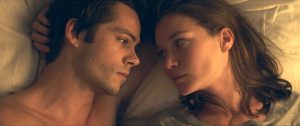 TG: Let’s talk about Karen! She’s the only Karen I’ll ever love. I adore her because her choice had been made. She was always kind of the point/counterpoint to Cindy. I was firmly Team Karen because while Fred was grappling with his choices, he was avoiding his mom and checking out of life. Karen was the one who stepped in and took his place. She wasn’t babying him though, she let him know that he should be the one doing it. She’s willing to be there and she’s willing to help, but she does have her limits.
TG: Let’s talk about Karen! She’s the only Karen I’ll ever love. I adore her because her choice had been made. She was always kind of the point/counterpoint to Cindy. I was firmly Team Karen because while Fred was grappling with his choices, he was avoiding his mom and checking out of life. Karen was the one who stepped in and took his place. She wasn’t babying him though, she let him know that he should be the one doing it. She’s willing to be there and she’s willing to help, but she does have her limits.
***
Hannah Gross plays Karen to simple, lovely perfection. As her frustration grows, we see her refuse to be long-suffering. She would rather Fred fix himself than stay in a relationship that’s ultimately one-sided. It’s kind of why the name MacBride chose for her is both fitting and unfortunate.
CM: It’s funny, the whole thing about her being named Karen. Dylan and I talked and we were like, ‘Should we change it?’, but ultimately we just owned it! There’s so many different, interesting ways to look at Karen. You’re so right about her decision being made. She wants a life with Fred and she can sort of sense – like all of us in a relationship can sort of intuitively sense things about our partners – that Fred’s just not there. Karen gets very put off by seeing him drawing again because she knows this is linked to his past and his past isn’t the greatest to her. He’s this guy who had this sort of pipe dream of being an artist and she supported him even though it was never going to work out. Him drawing means time when he’s not focused on his job, his future or her. She’s very aware of these little signs.
TG: Red flags.
CM: Yeah. And you know, she can’t wait forever. She sees him coming home and puking and he’s clearly been out with his old drug buddies. Karen also represents that – if the conceit of the film is that all time is simultaneous, and every experience we have in our lives is all happening at once – then Fred is always in his baby room. We see this reflected in a type of mother/son relationship, but with Karen. Outside of the movie, I think it’s something a lot of men do. It stems from men being immature and not as ready to be emotional adults as quickly as women are. With Fred, we see Karen dressing him in the morning, putting his clothes on, she’s bathing him in the bath, he’s kind of infantilized.
He recreates this a bit with his boss in different ways. That education about consequence and freewill is happening over and over in his life and his relationship with Karen is the most obvious example of that.
***
MacBride mentions Fred’s boss who is played by the incomparable Amanda Brugel. She so wholly encapsulates the role that I reached out to ask her thoughts on the character. She was busy filming Kim’s Convenience and The Handmaid’s Tale, but she did shoot back a short, perfect note.
“I do love me some data!”
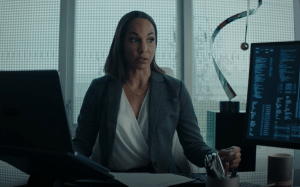
TG: It’s such a seemingly small role, but it’s so big. I’ve been a data analyst and it made me laugh because real data analysts just love data. If there’s anything to say about her character, it’s that she loves data. She sees that Fred is a capable young man and he has a certain way about him, and she just wants him to love the data. And he doesn’t quite have it in him. He’s constantly distracting himself and going through these motions. What was the thought process behind the choice of him being a data analyst and having this office atmosphere? And how does that affect Fred and his journey?
CM: Well I think everything goes back to the baby and the mother, you know? Every scene in the film I tried to link back to that somehow. When we’re infants we have to learn how to interpret data, raw data. How do you understand shape? How do you understand color, smell, your senses? It’s our parents – usually our mother – who is our first touchdown on how to learn this stuff about how we perceive data.
Do you truly have free will if someone is educating you and teaching you how to perceive the raw sensory information around you? I knew I always wanted Fred to have a job that was sort of representative of that. He’s in a big company, a big faceless sort of corporation that is just about data analytics. It’s not about the specifics of what he’s analyzing, it’s just finding patterns. What are the patterns and what to label them.
On the rooftop with Cindy later, she makes a reference to that kind of way of thinking, “I don’t want to be like everybody else, all most people are doing is labeling things.”
TG: Even the label maker has a label on it.
CM: Exactly! We’ve identified patterns and then put a name on it, ‘This is a name’, ‘This is time’, but that doesn’t mean you understand what it really is. So there’s an emptiness in Fred’s job because there’s no deeper understanding of what he’s doing. He’s just in this cubicle job putting labels on patterns. It’s the perfect starting point for him, to be in a spot where he hasn’t controlled his choices to end up where he is.
TG: I find it’s an emptiness in him to him. And I think that’s very specific. That’s why I enjoyed Amanda’s character because to [Evelyn], this work is completely fulfilling. That’s her jam.
CM: Yeah, we were talking about if the mother was a good mother. It’s the same thing with Amanda Brugel’s character. There was a scene we cut where Fred is back in his cubicle and [Evelyn] comes up to him and is like, ‘What are you doing?!’ and he tells her off or something like that. We cut it because she doesn’t deserve to be told off. She’s actually doing nothing wrong. She’s doing her job. Fred is the worst employee in the world!
TG: He’s always late, he’s doodling drawings all over the place!
CM: Lines and monsters all over his desk and you know, throwing computers around in front of the Board. He’s a terrible employee and [Evelyn] is right to be upset with him. Just like his mother is right to be upset with him. The cop was right to pull him over when he went the wrong way down a one way street. These forces of control that are around him are not evil and that’s something I always tried to make clear. The things that control you and restrain you aren’t necessarily independently nefarious. It’s your own choices that have put you in a corner.
***
In Flashback there are several cinematic nods to MacBride’s inspiration littered throughout the film.
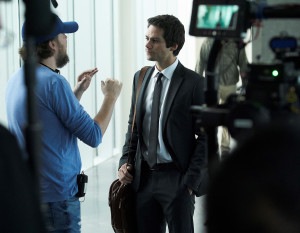
TG: Was there any inspiration from [science-fiction and fantasy author] Poul Anderson and the Many-worlds interpretation of Everett? Or alchemy and the use of colors to frame the narrative?
CM: Yeah, I definitely think about all of that stuff. I’m really into films by David Lynch and Federico Fellini, those are sort of my big influences. I love the way David Lynch films in particular layer imagery and they’ve loaded meaning into that imagery. It’s just like an onion, you peel each layer back and there’s so much interesting stuff there that all feels deliberate.
I love the idea of films being something you slowly discover over the years. A film that lives forever because you’re constantly discovering what it means and constantly noticing new things.
***
In the director’s commentary, MacBride mentions the decor in Evelyn’s office changes slightly each time Fred is inside, marking another point in his journey. You’ll also notice that when he and Karen move into the new apartment, none of the boxes have labels and are made to mirror the ottomans from his childhood home. There’s a sense of connectedness and a bit of discord which serves the tone of the film well.
Ultimately, the meaning is for the viewer to interpret. MacBride has an idea of what he believes the movie to mean, but understands that different interpretations will abound.
The choice is yours.
For more fun, be sure to check out the director’s commentary available on the blu-ray of Flashback, along with part 1 of my interview with MacBride and my review!
And be sure to stream Flashback out now OnDemand.
What was your favorite ‘Aha!’ moment of the movie? Share below!
Author: StickyKeys
Help support independent journalism. Subscribe to our Patreon.
Copyright © The Geekiary
Do not copy our content in whole to other websites. If you are reading this anywhere besides TheGeekiary.com, it has been stolen.Read our

